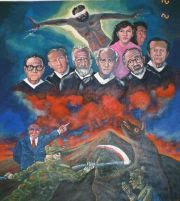El Salvador starts a proceeding in Jesuit massacre case
Today began the initial hearing in criminal proceedings against more than a dozen defendants in the case of the 1989 massacre of six Jesuit priests, their co-worker and her daughter. It represents the furthest step forward in the prosecution of this "crime against humanity" in a criminal court in El Salvador.
The basic outlines of the case are well known to readers of this blog. In November 1989, during the "final offensive" of the FMLN which brought fierce fighting into San Salvador, the military high command gave the order that Jesuit priest and rector of the University of Central America Ignacio Ellacuria and his fellow Jesuits should be assassinated and no witnesses left to the event. The operation would be carried out by the Atlacatl Battalion of the Salvadoran army on November 16, 1989.
An assistant prosecutor told the media today that:
Defendants are accused "for the murder of the Jesuit priests," procedural fraud, cover-up, acts of terrorism, "and other crimes."
“We are in the presence of facts constituting crimes against humanity and war crimes,” he added.
In addition to the high military command figures, two prominent Salvadoran politicians are also defendants in the case. Alfredo Cristiani was the president of El Salvador at the time of the massacre and is being charged in his capacity as then commander-in-chief of the armed forces. Also named as a defendant is Rodolfo Parker, long time former leader in the Legislative Assembly of the Christian Democratic Party. Both Cristiani and Parker are reportedly outside of El Salvador and potentially beyond the reach of Salvadoran justice.
The question of what Cristiani knew and when he knew it is one of the largely unanswered questions of the Jesuit massacre case. Cristiani reportedly told author Jorge Galan in an interview that he knew high military officers were responsible for ordering the murders. In December 2017, former Colonel Inocente Montano, gave a declaration which implicated Cristiani in meetings on the day of the killings. The declaration was given in the human rights trial in Spain where Montano attempted to downplay any involvement which he himself had in the planning of the massacre. Cristiani has said he does not know why Montano would attempt to involve Cristiani in the Jesuits massacre. The transcript of Montano's declaration, and a link to the audio of his words is available here.
Parker was a civilian lawyer for the armed forces at the time of the massacre and was singled out in the UN Truth Commission report for participating in a cover-up after the event:
Rodolfo Antonio Parker Soto, legal adviser to the General Staff, altered their statements in order to delete any reference to the existence of orders from above
Lieutenant Mendoza also pointed out during his testimony that, many days after his detention on 8 January 1990, CIHD called him to testify. However, in the middle of his testimony, Rodolfo Parker, lawyer and legal advisor to the Chief of Military Staff, interrupted him and ordered him to begin again without mentioning anyone who wasn’t Benavides or members of the Atlacatl Battalion. Or, in other words, to begin again without stating that Benavides had received his orders in a meeting with High Command.
According to a report this week in Revista Factum, a new witness in the case will be Walter Araujo. Araujo is a boisterous supporter of Nayib Bukele and Nuevas Ideas today, but in 1989 he was an advisor to Cristiani. Araujo told prosecutors that on various occasions Parker was heard complaining that he had taken steps to protect the High Command, but he ended up being singled out by name in the Truth Commission report.
Observers are watching this version of a prosecution in the Jesuit massacre case with a mixture of opinions. The hearings are proceeding at the same time that the Nuevas Ideas controlled Legislative Assembly is hurling accusations at the University of Central America where the murdered Jesuits lived and taught. Nayib Bukele has regularly scorned the UCA in tweets, especially as prominent leaders in the University speak out against Bukele actions they view as subverting Salvadoran democracy. The actions the UCA criticizes include Bukele putting into office the current Attorney General who is now prosecuting this case.
Perhaps this tension reflects why the prosecutors from the Attorney General's office did not object today when lawyers for the defense asked that lawyers from the Human Rights Institute at the UCA (IDHUCA) be removed from the role of "querellante," a type of victim advocate in Salvadoran criminal cases. If I were a prosecutor in the Jesuit massacre case, I would certainly want the assistance of the skilled lawyers from IDHUCA, who have lived with this case for decades. But the IDHUCA has consistently denied the legitimacy of current attorney general Rodolfo Delgado, and so the prosecutors passively allowed the judge to remove IDHUCA from its role in the case.
Prosecutors and the Bukele government state that they are simply attempting to bring justice which has failed in this case for more than 32 years. But there is not so subtle delight among Bukele's supporters for a prosecution of high profile figures from opposition political parties ARENA and the PDC.

Comments